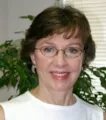By Carolyn Yeager, March 2011
copyright 2011 Carolyn Yeager
Déjà vu. Elie Wiesel becomes an American but his ties to Israel and manner of life don’t change.
Arriving in New York in 1956, Wiesel is greeted and assisted by “Israeli colleagues” who accompanied him and “served as real-estate advisors.”14 Everywhere Wiesel goes there are Israelis on hand to help; he is never alone or “on his own” and we must conclude that he never has been. Some of his named associates at the time are David Gedailovitch, a.k.a. David Guy, a perfume merchant and restaurateur; Jacob Baal-Teshuva, an Israeli Film weekly rep; Richard Yaffe, correspondent for an Israeli daily who had been subpoenaed by the House Committee on Un-American Activities. Wiesel hangs out with Jews, of which there were no lack in New York, and seems only comfortable with members of his own Tribe—even more so if they are fellow Zionists, which most seem to be. The French Catholic Francois Mauriac appears as the sole exception, but that relationship existed purely for career advancement.
Wiesel says he loved covering the United Nations, where he spoke most often with Abba Eban, Israel’s “young ambassador.” [Rivers, p 290] But, as he always does, he tells us that he wasn’t paid a living wage and had to “alleviate [his] financial problems” with free-lance work. Also, as so often happens, an unnamed benefactor shows up–an “editor” who told him he had no money for news reports, but did have a budget for a novel. Wiesel replied, “I may have something stuck in a drawer somewhere.”
Wiesel writes his first novel
I sat at the typewriter that very night, and in a week or two I churned out (under the pseudonym Elisha Carmeli) a romantic spy novel of which I remember only the premise: A man and a woman, both Israeli intelligence agents, are desperately in love, and one or the other is sent on a mission to Egypt. I can’t recall if the operation was a success, but I do know that all my characters died at the end, since I wasn’t sure what else to do with them. [p. 291]
Déjà vu, indeed. Under pressure, Wiesel churns out in “a week or two”—just as he did on the ocean liner to Brazil less than two years previous15—a spy novel? In this instance, we have to assume he was still working at his regular job, so the fact that it was a shorter book should not be held against him. But, here are my questions: How does he explain that as a religious, idealistic young man, he knew how to weave together a believable story about Israeli spies? Why did he even choose the subject of spies, rather than a simple romance between displaced persons, or immigrants to Israel—something he had seen close up, and even experienced? I know enough about writing to know that when one has to write something in a hurry, one will always choose the most familiar theme. Otherwise too much research is required; without it, mistakes will certainly occur.
Though this is a small detail tucked into Wiesel’s memoir, I think it speaks volumes about that with which Wiesel was actually familiar.
The “editor” published the book under the title, Silent Heroes.16. Wiesel says he never read the book, but Simon Weber, news editor of the Jewish Daily Forward, noticed it and, based on it, offered Wiesel a job with his newspaper. Wiesel describes the Forward as “the world’s biggest, richest, and most widely read Yiddish daily.” [p. 291] It must have been some book! Weber didn’t hire Wiesel because of his great journalism, but because of a silly spy novel, quickly thrown together. This makes no sense except as another typical Wieselism. Wiesel obviously had connections and assistance at high levels, but he wants us to believe in the holocaust victims’ luck and miracles. Or maybe it’s that he is himself so immersed in lies that he’s incapable of telling the truth about anything. In that regard, we now come to the Big One.
Wiesel gets hit by a taxi and flies through the air to land a full block away
On a summer evening in 1956, Wiesel was crossing Seventh Avenue at Forty-fifth Street with a woman from his office when he was hit by a taxi.
The impact hurled me through the air like a figure in a Chagall painting, all the way to Forty-fourth Street, where I lay for twenty minutes until an ambulance came to take me to the hospital. […] My entire left side had been shattered. A ten-hour operation was required to reconstruct it, leaving me in a cast from neck to foot. […] One morning I was visited by a lawyer who said he represented an insurance company. He had a proposition for me: If I signed a certain document, a simple piece of paper, he would hand me a quarter of a million dollars on the spot. […] I was ready to sign that document and any others in his bulging briefcase. But my journalist friend Alexander Zauber screamed, “Are you crazy? Don’t sign anything!” […] You really want to let this crook ruin us? Tell him to get the hell out of here! I’ll get you a lawyer who defends victims instead of swindling them. You’re going to be a millionaire, I guarantee it!” [p.293-95]
Zauber showed the insurance emissary to the door. But Wiesel was worried about paying his current bills, mostly because he was about to be moved into a double room, for him “a terrifying prospect. Ever since the war the idea of sleeping in the same room with a stranger had panicked me.” With the immediate insurance money, he could remain in a private room. Therefore, he decided to call the insurance agent back that night, after Zauber had gone. [p.296]. But again, help arrived from the Irgun …
I had forgotten to allow for the possibility of a miracle. Among my visitors that day was Hillel Kook, who asked Aviva and other friends to leave us alone. He was an unusual man, the archetypal Central European intellectual in demeanor and looks; nearsighted, thin, tense, and curious. I had interviewed him several weeks earlier. He had just founded a political organization to combat Soviet interference in the Middle East. I knew him by reputation only. A member of the Irgun high command under the alias Peter Bergson, he and the writer Ben Hecht had directed the Committee of Hebrew National Liberation during the war. Their main objective was to save European Jews. In fact, no one had done more than Bergson to alert the American public to the tragedy of the Jews under the Nazis. Consequently, he was thoroughly disliked by the American Jewish establishment, which consistently fought and slandered him. During the Altalena affair he was even imprisoned by Ben-Gurion. “I heard what happened to you,” he said, coming straight to the point. “As you’ve probably discovered by now, being sick in New York costs money. You don’t have any, but I do. So I brought you a few blank checks. Fill them out as the need arises, and let me know when you need more.” Hillel’s manner was matter-of-fact, as though he made gestures like this every day. [p.296]
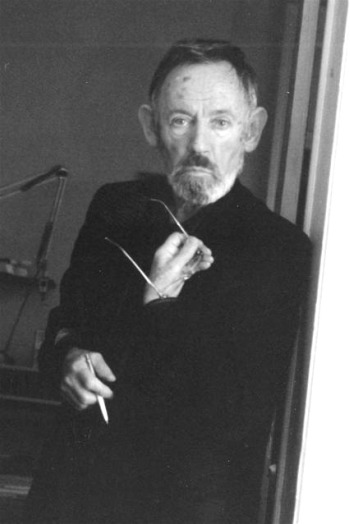
I was so overcome by his generosity that I was unable to utter a word. I gaped at him as though he were a tzaddik or an emissary of the Prophet Elijah, most unpredictable of prophets. Finally I managed to ask him how I would ever repay him. “Don’t worry,” he replied, as nonchalant as a banker addressing a colleague. “I have plenty to live on. You can pay me back when the insurance company pays you off.”
When Aviva and the others came back in, I told them of the miracle. Zauber cried, “It’s a sign from God. He wants you to listen to me. Don’t be a fool. Now you can stay in your own room and you can hire my lawyer.” “You’re going to be a millionaire,” he said. “My friend the millionaire. I warn you, if you sabotage my plans, I’ll kill you. And my lawyer will defend me.”
Every week, Hillel called to find out if I needed more checks. In the meantime, the lawyer filed the suit that he and Zauber assured me would change my life for good. I made statements, signed documents and depositions. A month, a year went by. I returned to my hotel. Zauber returned to Israel, Bea to Montreal. From time to time I asked the lawyer how things were going. He was a patient man, and he advised me to follow his example. Eighteen months after the accident he accompanied me to court. This was not yet the trial, but a simple procedural matter. Two years after the accident, there was still nothing. One day Hillel called me, and we had coffee together. He asked me about the trial. Wall Street, it seems, had not been kind to him, and he was short of cash. But not to worry, he would work it out. He would wait. That day I instructed my lawyer to settle the matter within the week. He tried to talk me out of it. […] The next day he informed me of the result of his negotiations: He would receive 30 percent of my payment and from the rest Hillel would be paid back.
That’s how I failed to become a millionaire. [p. 297]
The prodigal visits his hometown Sighet
In 1960, Wiesel’s book Night was published in English, but was slow to catch hold. In 1961 the Adolf Eichmann trial in Jerusalem was the object of his attention and journalism, which he covered for the Forward. In 1964, at the age of 35, he [or his handlers] decided the time was right for a trip to Sighet, his alleged hometown, via Budapest, Bucharest and Baia-Maire. [p. 357]
In Budapest I visited the Jewish quarter, seeing traces of its past. […] When I finally did return to Sighet, the cemetery was the first place I wanted to visit, to meditate at my grandfather’s grave. As is customary, I would have to light candles. I found a store and bought two candles. So it was that I had the feeling I was following a scenario written by someone who existed only in my imagination. Michael 18 was my precursor, my scout. I followed his every step. I saw through his eyes, felt what he felt as I wandered the streets among passersby who didn’t recognize me or even glance at me, and as I entered my home, a stranger in my own house. [p. 357-8]
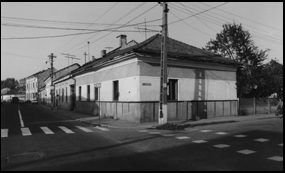
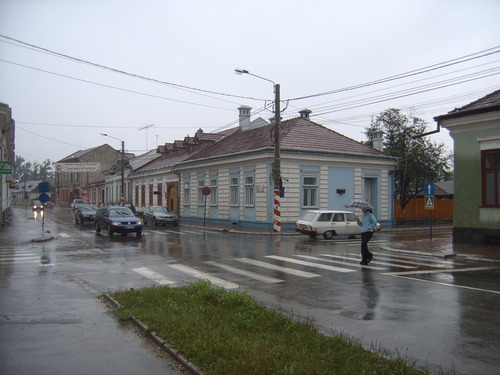
We should not be surprised that Wiesel again experiences his early life as if he were a character in his own fictional writing. In Night, supposedly the “true” account of his time at Auschwitz and Buchenwald [“every word is true”], he was Eliezer, the 13-year-old boy [not 15 as he was in real life] who saw flames shooting from the crematory chimney as he disembarked from the train at midnight, followed by a burning pit of fire in which babies were being thrown. Now, he becomes “Michael,” from another of his novels, as he “wanders” through Sighet. Was it so unfamiliar because he had never really lived there, just as he was never really in Auschwitz or Buchenwald?
Further, we can ask: How did he “enter his home?” Was it empty? Did he ask the current residents for permission? Those answers not being given, it remains left to our imagination.
Though it hadn’t changed, I found it hard to orient myself in the little town. It seemed not to have endured a war. The streets were teeming with people. The park was as it had been, the trees and benches still in place. Everything was there. As before. Everything except the Jews. I looked all over for them, looked for the children
[…]
I roamed the streets, stopped at the movie house, went to the hospital. No one paid attention to the prodigal returning home from afar. It was not only as though I didn’t exist, but as though I had never existed. Had there really been a time when Jews lived here? 19 [p.358]
[…]
I continued my rediscovery of Sighet. Walking down the Street of Jews—almost every town in Eastern Europe had one—I saw nothing but sealed shutters and doors nailed closed. All […] now stood empty. It struck me how poor they had been, those Jews of Sighet so dear to me. That was true of all of us, though as a child I had been unaware of the poverty that prevailed in the Jewish neighborhoods. 20
[…]
I set out to see the synagogues again. Most were closed. In one I found hundreds of holy books covered with dust. The authorities had taken them from abandoned homes and stored them here. In a frenzy, I began to look through them. I was rewarded when I discovered a few that had belonged to me. I even found some yellowed, withered sheets of paper in a book of Bible 21 commentaries: a commentary on the commentaries I had written at the age of thirteen or fourteen. The handwriting was clumsy, the thoughts confused. [p.359-60]
Which “authorities” is he referring to: Jewish or Hungarian? Would the Hungarian police have bothered to take books out of the homes and store them? And what are the odds that he could look through “hundreds of books” in the time he had and find some of his own in the piles? Or that his would be stored at one of the few still-open synagogues in Sighet and his commentaries were still in them? He falls back on his previously used artifice that it was possible because he did it “in a frenzy.” As he typed 862 pages of a difficult manuscript in two weeks max in 1954—in a frenzy, so now he does another impossible task in a frenzy. Further, has anyone ever seen these handwritten commentaries? Would he have left them there? They would offer proof that he actually lived in that town.
Previously I wrote about the question of Wiesel’s typing ability. He has written that he sometimes went as a youth to the synagogue ‘office’ where he used the only typewriter available in the community to type up his religious commentaries. But now he writes that those he found were handwritten. He has also made it clear that all his adult writing has been done in longhand, not typewritten. This is unusual for someone with a long career as a journalist.
A mission to bring Soviet Jews to Israel
In 1965, Wiesel made an “unexpected journey to the Soviet Union.” It may have been unexpected because the Israeli Ministry of Foreign Affairs requested that he go, but he was carefully prepared for it.
Meir Rosenne and Ephraim Tari, two of the most effective and devoted young diplomats in the Israeli Ministry of Foreign Affairs, prepared me. Both spoke French, were interested in literature, and, as it turned out, belonged to a semiofficial government office reporting directly to the prime minister. Meir in New York and Ephraim in Paris oversaw clandestine activities on behalf of Soviet Jews. It was an arduous task, more dangerous than it appeared. Arduous because even the largest and most influential Jewish communities refused to become actively involved. They were delighted to aid Israel, but the desperate Jews behind the Iron Curtain were both distant and invisible. Nobody seemed to know what concrete action Soviet Jews really wanted Jews in the West to take for them. [p.365]
[…]
How many were they? There was talk of millions, but that figure seemed implausibly high. “You ought to go and see,” both Israelis told me. “You have been a witness before, now you must go and find out the Soviet Jews’ true situation and testify for them.” […] I was briefed by experts. [p.366]
Why was Wiesel the choice of the Israelis who reported directly to the prime minister about clandestine activities regarding Jews in the Soviet Union? Was he famous in 1965? Was he the High Priest of the Holocaust at that time? No, that was still to come. But he was a Mossad agent, and on their payroll, at least as a retainer. Wiesel seems up to now to have been involved when immigration of Jews to Israel—legal or illegal—was concerned, and to bolster the feelings of Jewishness of those in the diaspora. This trip appears to follow in that vein. Communist Jews were perfectly acceptable, as dark-skinned Morrocan and Ethiopian Jews were earlier. The idea was to fill up Israel with Jews in order to keep claiming more of the physical territory of Palestine.
I left for Moscow in time for the High Holidays, then went on to Leningrad, Kiev, and Tbilisi. I returned transformed […] I immediately felt close to these forgotten, tenacious Jews. … Having survived the massacres of the Nazi era and the Stalinist persecutions, they proclaimed their Jewishness even in the heart of the Gulag and the cellars of the NKVD and KGB. [p.366]
[…]
We were determined to help the Jews left behind the Iron Curtain, even if we had to defy the Kremlin and all its police. We had been privileged to make the surprising discovery that with a number of notorious exceptions, even Communist Jews had remained Jewish. [p.369]
Notice the “we.” He was working with others on behalf of Zionism and its goals, not on his own. Wiesel can find good things to say about all Jews, no matter how much blood is on their hands—for example, Zinoviev and Ehrenburg.
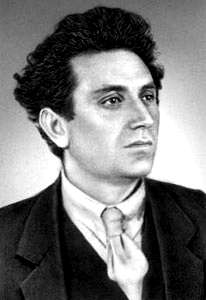
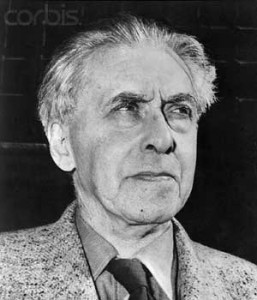
A journalist friend told me that Zinoviev—Lenin’s companion and ill-fated admirer/adversary of Stalin—faced execution with the Shma Yisrael on his lips. All his life he had clung to his atheism. For a Jew to be a Communist meant repudiating his or her Jewish faith, Jewish tradition, Jewish history.22 And so many became resigned to integration, assimilation, and mixed marriages—anything to ensure that their children would no longer be tied to the Jewish people or to Jewish destiny. And yet …
Ilya Ehrenburg was an example. During the last years of the war, along with Vasily Grossman (author of the brilliant Life and Fate), he scoured cities and villages, gathering chronicles and testimony from survivors of the ghettos and the camps. Together they compiled an anthology of human cruelty and Jewish suffering reaching from Vilna to Minsk, Berdichev to Kiev, Kharkov to Odessa. This “black book” contained accounts one cannot read without feeling despair. It was not published because by 1945 Stalin had changed his policy toward both Germany and the Jews. The Kremlin’s spokesmen and propagandists received orders to no longer emphasize German atrocities or the calvary of their Jewish victims. […] It was he [Ehrenburg] who had entrusted a copy of the manuscript to a reliable friend who was to convey it to Jerusalem when the chance arose. Novelist, pamphleteer, propagandist, and Communist, if not Stalinist, Ehrenburg nevertheless had remained a Jew at heart. [p.369]
Ehrenburg, the murderer of millions of Russians and Germans, is hailed as a True Jew by Elie Wiesel! This is the true Wiesel, who will forgive any Jew as long as he professes himself a Jew and proves loyal to Jewry. He celebrates this recognized monster, releasing him of all his sins because he compiled a book of Soviet lies about “Nazi atrocities” and the sufferings of Jews. Stalin changed his policy in 1945 because Germany was no longer a threat to him, but the Jews were, just as they had been to Germany before, and before that to Czarist Russia. This is a low point in Wiesel’s memoir, but he is trapped in his own ideology and complete insensitivity to any but Jews.
A second trip to the USSR
Wiesel made a second trip to the USSR about a year later. Though it was more difficult to get in since he had published about his first trip, still he and a friend, Michel Salomon, managed to return. Once again his high-level connections made it possible. At the airport,
the Israeli charge d’affaires, David Bartov, and his wife, Esther, had come to greet us. [ …] We sped through the city in David’s diplomatic vehicle. Two spacious rooms had been reserved for us at the National Hotel. That very evening the Bartovs took us to a performance by a traveling Yiddish troupe. [p.370]
Don’t they ever get away from Jews? No, they don’t appear to have any desire to. Also, note what priceless benefits statehood has brought to international Jews–they have diplomats with special privileges and immunity, and greatly improved international connections.
On this trip, Wiesel says he was followed by KGB agents, his hotel room was searched while he was out, and the copy he brought along of his newest book on the plight of Russian Jews, The Jews of Silence, was taken. Finally frightened by this, he was back at the airport for a return flight back to Paris, about to board, when …
The young woman motioned to me to board, but at the same instant the officer shouted something. Suddenly things moved quickly. Before I realized what was happening, the two Israelis were at my side. One of them took my ticket while the other snatched my passport out of the officer’s hand. I felt myself being lifted like a package. They ran, and so did I, amid whistles and shouted orders. I don’t know how we managed to jostle our way through all the gates and barriers, but we jumped into the embassy car and took off. Why the police didn’t stop us, I don’t know. I was too stunned to try to understand, too dazed to think about it. The Israeli behind the wheel drove as if he were back home in Tel Aviv. I would worry about that later. In a moment we were on embassy grounds. [p.374]
Wiesel tells about this trip in great detail, taking five pages, which means it probably happened the way he says. Why can he do it in this instance, while other, more important events in his life are sloughed over in a single paragraph? I leave the reader to answer that. After spending three days at the Israel Embassy, things were “straightened out.”
Accompanied by my two Israeli bodyguards, I returned to the airport. Everything went smoothly. The Intourist and Aeroflot employees greeted me amiably. There was no problem […] The plane was half empty. I had the whole first-class section to myself. 23
[…]
I arrived in Paris just in time for the annual conference of French Jewish intellectuals organized by Jean Halperin and Andre Neher under the auspices of the World Jewish Congress. Rather than speak on that year’s designated topic (God and …), I recounted my experiences and impressions while in Moscow. [p375-6]
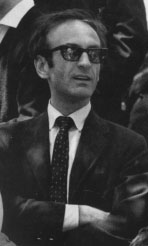
A couple pages later, we gain some insight into Wiesel’s fanatical and totally Jew-centered world-view when he speaks about the Talmudist Saul Lieberman, with whom he was thrilled to be able to study.
He made me aware that to be a Jew is to place the greatest store in knowledge and loyalty; that it is because he recognizes divine justice that he speaks out against human injustice. That it is because a Jew remains attached to his God that he is permitted to question Him. It is because the prophets loved the people of Israel that they admonished them and reprimanded their kings. Everything depends on where you stand, my master used to say. With God anything can be said. Without God nothing is heard. Without God what is said is not said. [p.380]
This explains to some extent to me why they can lie so easily. All Jews are with God, therefore anything can be said. Those without God—goyim, gentiles—are not heard. What they say is not said, means nothing. This is a reasonable interpretation which we see acted out everywhere before our eyes. It makes clear why the Gentile world and the Jewish world cannot adjust to one another. All such talk by Jews that if the Gentiles would just make enough concessions it would be possible, is deceitful. At least it is when dealing with Jews like Elie Wiesel and Saul Lieberman.
The Mossad motto: By way of deception (deceit), thou shalt make war (defeat thine enemies). Elie Wiesel has been shown again and again to be deceitful. Thus, he is perfectly in tune with the Mossad.
Endnotes:
14. Elie Wiesel, Memoirs: All Rivers Run to the Sea, Knopf, 1995, p. 286.
15. Wiesel claims to have written Un di Velt Hot Gesvign, a Yiddish manuscript of 862 pages, while on a boat traveling to Brazil in Spring 1954. See https://www.eliewieseltattoo.com/the-shadowy-origins-of-night
16. Silent Heroes is not ever listed among the books Wiesel authored, nor could I find it at Amazon.
17. http://www.foreignpolicy.com/articles/2010/04/27/pen_portraits_from_a_forgotten_middle_east?page=0,4
18. Michael is the main character in his book The Town Beyond the Wall [1962], a fictional account of his life in Sighet.
19. According to one visitor: In the spring of 1944, more Jews than Gentiles lived in Maramureş, a remote part of Romania then under Hungarian control. Most had come in the late nineteenth and early twentieth centuries from Russia. (They are really Russians, not Hungarians or Romanians.) Some worked the farms, and some lived in villages and towns, working as traders and craftsmen. There were synagogues in most villages, and in the regional capital, Sighet, Jews worshiped at the elaborate synagogue on Nagykoz Street.
20. Yet Wiesel, or his handlers, presents his family as prosperous, progressive, cultured and upstanding. We see pictures of them looking fairly middle-class. Sighet was the capital city of the province. What is the reality?
21. By “Bible” he really means Talmud.
22. This is simply not true, but is Wiesel’s attempt to separate Jews from the Communist taint.
23. We learn from this that Wiesel travels first class. What else would we expect?
- Printer-friendly version
- 20308 views
